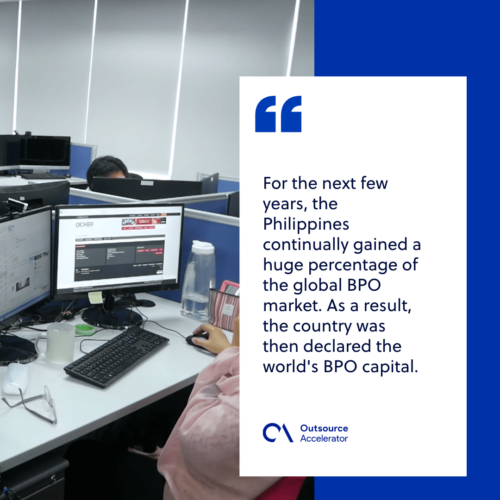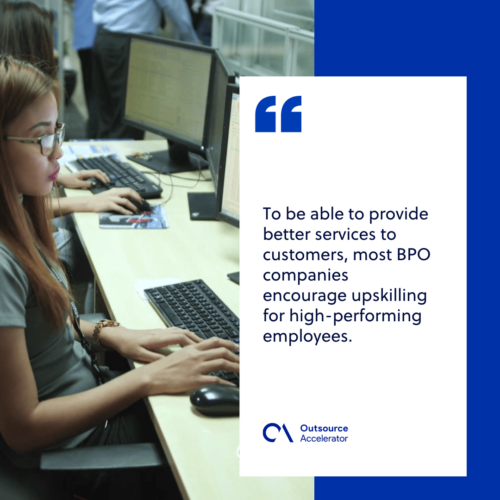The Philippines: Call center capital of the world

Globally recognized as the “call center capital of the world,” the Philippines continuously impresses global organizations.
Potential clients say Filipinos are highly admired for their remarkable talents, personality, and character.
On the other hand, it is no secret that the Philippines offers a lower cost of living than other countries. But even with the lower cost, productivity remains outstanding.
Advantages such as proficiency in English, cultural affinity to Western countries, low labor costs, hard work, and kindness impress several businessmen to build more call centers in the country.
These are a few reasons why the Philippines remains the ideal outsourcing destination for call centers and businesses worldwide.
A brief history of the Philippine call center industry
In 1992, the first call center in the Philippines was built by Frank Holz. Seeing the industry’s potential, the country’s Congress passed the Special Economic Zone Act in 1995.
It paved the way for the creation of the Philippine Economic Zone Authority (PEZA), which offered incentives and attracted foreign investors in the process too.
During the early 2000s, the outsourcing industry accumulated 0.075% of the country’s GDP. It was also in the same year that a US-based outsourcing center moved its operations to the Philippines. This opened at least 8,400 vacant jobs for unemployed Filipinos.
In 2013, the industry recorded 900,000 full-time Filipino employees who helped lessen the country’s unemployment rate.
For the next few years, the Philippines continually gained a huge percentage of the global BPO market.
As a result, the country was declared the world’s BPO and call center capital.
As the effort increased, outsourcing in the country started to get recognized even by the World Trade Organization in its 2019 World Trade Report.

The Philippine call center industry moving forward
The call center and BPO industry remained resilient during the pandemic.
Call and contact centers adapt easily to remote work, so during this time, they continued to provide unparalleled service to customers worldwide.
This move helped BPOs, especially call centers, easily bounce back. In fact, the industry still recorded a revenue of US$ 26.7 billion for 2020 alone.
It even helped generate 23,000 call center jobs in the whole country.
Attractive factors such as cost competitiveness and dynamic talents have continually been the key ingredients in attracting more businesses.
As Philippine call centers quickly grew in 2021, experts see a brighter future ahead for the industry.
In addition to this incessant growth, emerging trends have become a huge ordeal. Some of these include the following:
Robotic process automation
Contrary to what experts believed, the BPO sector sees robotic process automation as a value-adding opportunity rather than a threat.
The Philippine BPO industry has started integrating automation into its workload.
Still, many believe in the human element’s importance in making AI work.
Instead of making it a primary driver of their operations, call centers use AI to provide value-added services to their clients.
Social media as a customer service channel
Connecting to customers has been easier with social media. Popular platforms such as Facebook and X are proven to be quicker ways to answer their queries.
Cloud computing
The demand for cloud computing services spiked with the need for companies and BPOs to render remote work in 2020.
This is expected to continue even years after the pandemic, paving the way for demand for IT outsourcing.
With cloud computing, you can rent a professional IT infrastructure to accommodate your server, storage, or networking needs.
This would allow Philippine call centers to store and back up their customer files rather than spending tons of money to own the technology in-house.
Upskilling
To provide better customer service, most BPO companies encourage upskilling for high-performing call center agents.
Provided with intensive training sessions to upgrade their skill sets, the staff are then expected to be able to handle more responsibilities.
Call centers are part of the ever-changing BPO industry where technological advancements are inevitable.
Changes in this industry are quite common; following them is the only way to keep up with the trends.

Why do huge foreign companies outsource their call centers to the Philippines?
To be called the world’s call center capital, a country should at least be swarmed by hundreds of companies worldwide. And that is exactly why the Philippines has been dubbed as one.
Top call center companies from all over the world have established operations in the country since its inception.
These companies cater to clients from around the world, with most coming from Australia, the United Kingdom, New Zealand, and the United States, among others.
What prompts them to outsource their call centers are determinants such as value services for a very low cost.
But more than that, the Philippines is highly regarded for providing one of the best customer services in the world.
Huge Australian-based companies such as Telstra, Optus, and Jetstar have experienced outsourcing their call centers to the Philippines. Doing so has helped them seize the savings and allocate them to expand their businesses further.
Other American corporations such as Citibank, Safeway, Chevron, and Aetna also outsource their services to the country.
These foreign companies believe Filipinos are customer-centric and easy to talk to. As English is the second language used in the country, well-trained agents are undoubtedly fluent compared to other countries.
The call center agent workforce in the Philippines
The call center agent workforce in the Philippines is one of the biggest in the world, with over 1 million people working in various call centers across the country.
The Philippines has become a popular destination for companies outsourcing their customer support, sales, and other back-office operations.
The country has a relatively low labor cost compared to other countries like India, Australia, and China.
The Philippines’ status as a country with a huge population of young people who speak English as a second language has helped immensely.
There are plenty of candidates to choose from when hiring agents.
Outsource to the ‘call center capital of the world’ today!
As the fastest-growing industry in the Philippines for over a decade, call centers in and out of the metropolis are continuously emerging.
They range from startups with hundreds of staff to businesses with 1,000+ employees.
Nevertheless, the Philippines still holds the title of being the “call center capital of the world.” Up to this day, the developing call center industry in the country is not seen to be slowing down any time soon.
If you’re contemplating outsourcing your customer service, you’d better get professional insight. Browse our BPO directory to get access to the highest-rated outsourcing firms.







 Independent
Independent




